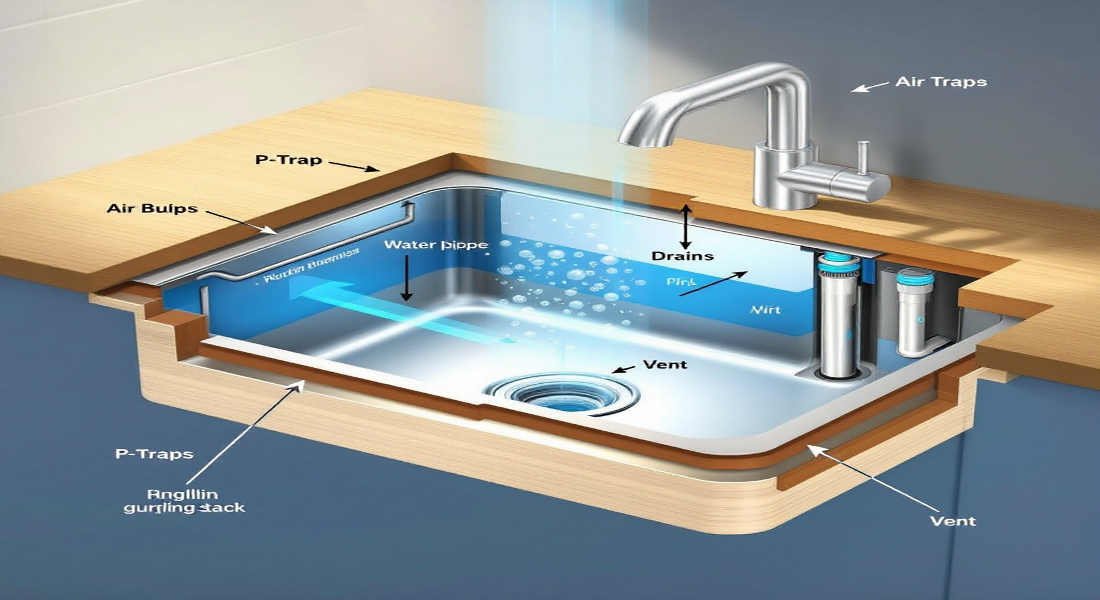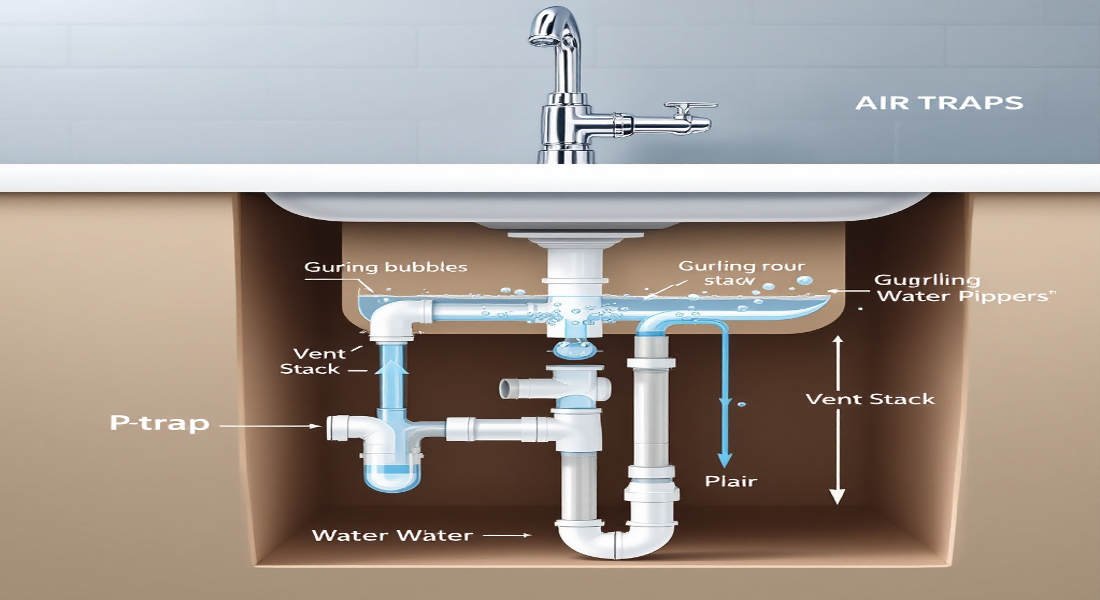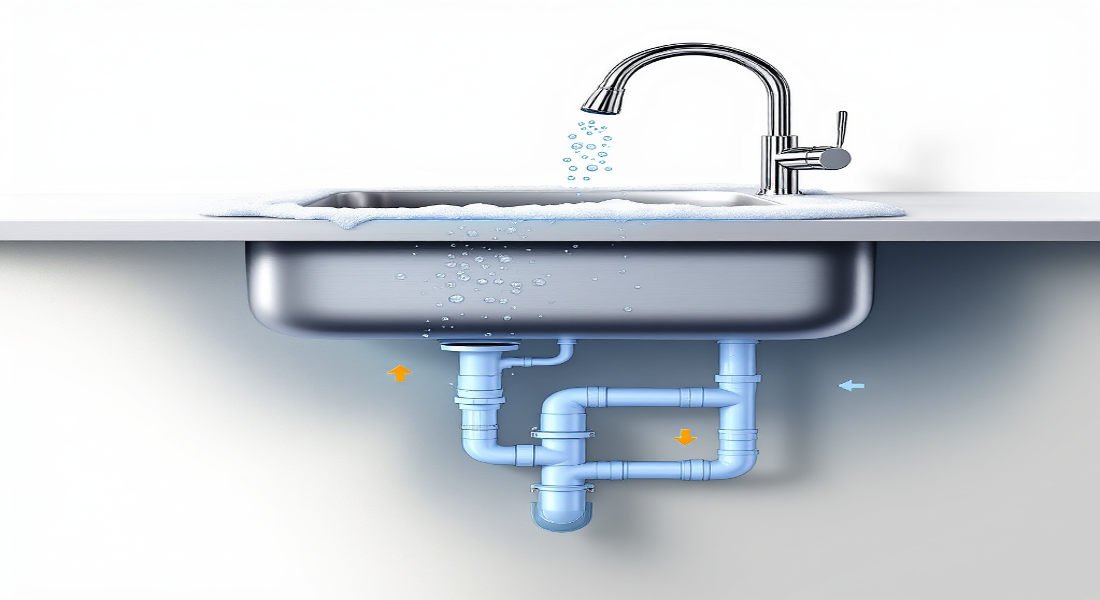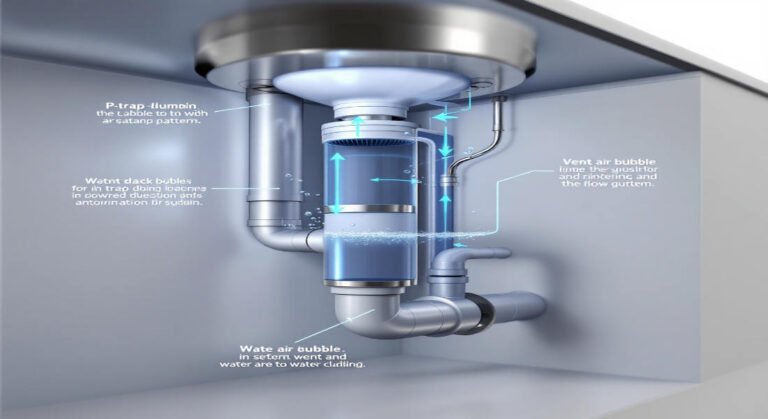A mysterious gurgling sound coming from your kitchen sink when it’s not even in use can be puzzling, even unnerving. For many homeowners, this is a common yet overlooked issue. Why does the home kitchen sink gurgle? Is it just an odd noise, or could it signal a larger plumbing issue?
Understanding the Gurgling Sound in Your Kitchen Sink
What Is a Gurgling Sink?
A gurgling sink refers to the bubbling or sloshing sound you hear within the plumbing system. It occurs when air gets trapped in the drainpipes and is forced out as water flows through. Unlike other plumbing noises like dripping or banging pipes, gurgling is directly linked to airflow problems in the drainage system.
Homeowners often notice this sound even when the sink isn’t in use. This is because the plumbing system is interconnected—water movement in other parts of your home, such as flushing the toilet or running the dishwasher, can affect the kitchen sink.
Why Does the Home Kitchen Sink Gurgle?
The gurgling sound can result from several factors, ranging from minor clogs to serious venting issues. Here’s a quick overview of the most common causes:
- Blocked drain pipes
- Vent pipe issues
- Air trapped in the pipes
- Sewage backflow
- Other obstructions
In the following sections, we’ll explore the science behind these causes and how they contribute to the gurgling noise.
The Science Behind Sink Gurgling
Basic Plumbing Anatomy
To understand why your sink gurgles, it’s essential to grasp how your kitchen’s plumbing system works. Here’s a brief breakdown:
Plumbing Component Function
Drain Pipes Carry wastewater from the sink to the sewer system.
P-Trap: A curved pipe under the sink that prevents sewer gases from entering.
Vent Pipes Allow air to flow into the system, maintaining proper drainage.
In a well-functioning system, water flows smoothly down the drain while air enters through the vent pipes to balance the pressure. If this balance is disrupted, it can lead to gurgling sounds and even drainage issues.
How Airflow and Water Movement Cause Gurgling
Air plays a crucial role in your plumbing system. When water flows through the pipes, it pushes air ahead of it. Vent pipes provide a pathway for this air to escape. However, when vent pipes are blocked or there’s a clog in the drain, the air gets trapped and escapes through the sink, causing the gurgling sound.
You may also read (secrets of a chefs house kitchen).
For example:
- A clogged drain blocks water flow, creating a vacuum that sucks air into the system.
- A blocked vent pipe prevents air from escaping, forcing it to bubble back up through the sink.
Common Causes: Why Does the Home Kitchen Sink Gurgle?
Blocked Drain Pipe
The most common cause of a gurgling sink is a clogged drain pipe. Over time, food debris, grease, and soap scum accumulate in the pipes, narrowing the passage and trapping air.
Signs of a Blocked Drain:
- Slow water drainage
- Foul odors from the sink
- Visible bubbling when water drains
Solution: Minor clogs can often be cleared with a plunger or natural remedies like baking soda and vinegar (more on this in the DIY solutions section).
Blocked or Improperly Installed Vent Pipe
Vent pipes are crucial for maintaining airflow in the plumbing system. If the vent pipe is blocked—by leaves, debris, or even animal nests—it creates negative pressure, leading to gurgling noises.
In some cases, vent pipes may have been improperly installed during construction or renovations, further exacerbating the problem.
How to Identify Vent Pipe Issues:
- Gurgling noises occur when other fixtures (e.g., toilets, dishwashers) are used.
- Persistent drainage problems despite clearing clogs.
Air in the Pipes
Leaks, improper venting, or high water pressure can introduce air into the pipes. Air bubbles trapped in the system escape through the sink, causing the telltale gurgling sound.
This issue may also lead to water backups if left unchecked, signaling a deeper plumbing problem.
Sewage Backflow
One of the more serious causes of a gurgling sink is sewage backflow. This occurs when waste from the sewer system reverses into your home’s plumbing.
Common Causes of Sewage Backflow:
- Clogged or damaged sewer lines
- Overwhelmed municipal sewer systems during heavy rain
This is more than just an annoyance—it can pose serious health risks and should be addressed immediately by a professional plumber.
Other Less Common Causes
Sometimes, the gurgling noise is caused by less obvious factors, such as:
- Foreign objects lodged in the drain (e.g., small toys, jewelry).
- Aging pipes that have developed cracks or leaks.
- Regional plumbing code issues that affect venting efficiency.
Diagnosing the Problem: Step-by-Step Guide
When your kitchen sink starts gurgling, follow these steps to pinpoint the issue:
Visual Inspection
- Look under the sink for leaks or visible blockages.
- Check the P-trap for standing water or debris buildup.
Listening and Observing
- Note when the gurgling occurs (e.g., after running water, when another fixture is used).
- Pay attention to any foul odors or slow drainage.
Testing the Vent Pipe
- Inspect the vent pipe on the roof for obstructions.
- Perform a water test by pouring water into the vent pipe to see if it drains freely.
When to Call a Professional
- If the gurgling persists despite your efforts.
- If multiple fixtures are affected or you notice sewage odors.
DIY Solutions for a Gurgling Kitchen Sink
Clearing Minor Blockages
- Flush the drain with hot water to dissolve grease.
- Use a plunger to dislodge small clogs.
- Try the baking soda and vinegar method:
- 1. Pour 1 cup of baking soda into the drain.
- 2. Follow with 1 cup of vinegar.
- 3. Let it sit for 15 minutes, then flush with hot water.
Addressing Vent Issues
- Clear visible debris from the vent pipe.
- Avoid climbing the roof unless you’re experienced—call a professional for major blockages.
Preventative Maintenance
- Dispose of food scraps and grease in the trash, not the sink.
- Clean your drain regularly with non-toxic cleaners.
- Install and maintain sink strainers to catch debris.
When to Call a Professional Plumber
Persistent gurgling, multiple fixtures affected, or signs of sewage backflow require immediate professional help. Ignoring these issues can lead to water damage, health hazards, and costly repairs.
Preventing Future Gurgling Issues
Best Practices for Homeowners
- Use a sink strainer to catch food particles.
- Flush the drain with hot water weekly to prevent buildup.
- Schedule professional plumbing inspections annually.
Upgrading Your Plumbing System
Investing in modern plumbing solutions, such as advanced venting systems, can greatly improve drainage and prevent gurgling noises.
You may also read (tighten my home kitchen faucet)).
